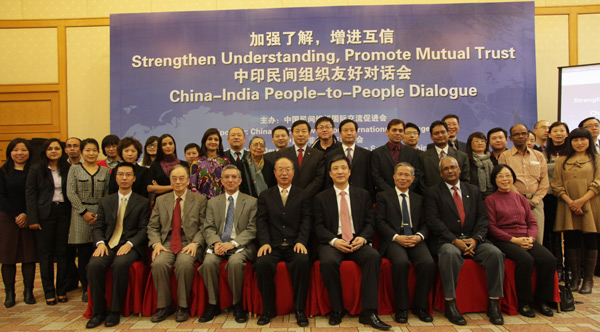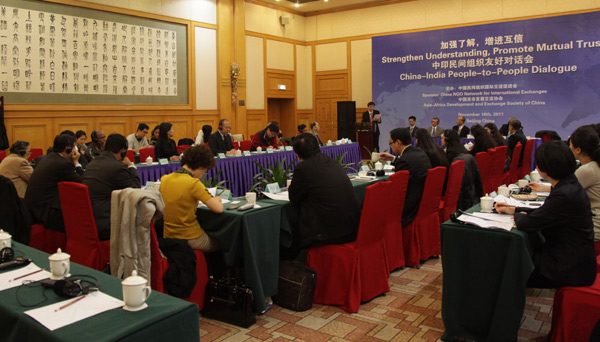China and India NGOs looking at citizen dialogue
Updated: 2011-11-16 19:13
By Feng Xin and Wu Huiting (chinadaily.com.cn)
|
|||||||||
BEIJING - About 50 representatives from Chinese and Indian non-government organizations (NGOs) exchanged ideas on promoting people-to-people dialogue between China and India, two of the world's fastest growing economies, in Beijing, Nov 16.
Themed "Strengthen Understanding, Promote Mutual Trust," the dialogue was jointly held by the China NGO Network for International Exchanges (CNIE) and the Asia-African Development and Exchange Society of China (AADESC).
|
 Representatives attending the people-to-people dialogue between China and India pose for a group photo in Beijing, Nov 16. [Photo/chinadaily.com.cn] |
"China and India have a lot of commonalities both in terms of economic growth and challenges the two countries face," said P.D. Kaushik, the advisor to the chairman of Lokashray Foundation, a housing foundation in India. Kaushik, who also works as an evaluator giving performance assessment to non-government organizations in India, said the two countries can share many experiences in NGO work with each other.
|
 Representatives attend the people-to-people dialogue between China and India in Beijing, Nov 16. [Photo/chinadaily.com.cn] |
"We cannot tell our Chinese counterparts what to do, but we might be able to share some experiences of what we do and suggest to them what not to do," Kaushik said. For example, in India, NGOs are becoming the "fourth or fifth estate" to fight against corruption and poverty and increase the public's access to education and healthcare resources, the advisor said.
"But NGOs should know that they cannot replace the government, and they have to act within the law," Kaushik said.
Speaking about a collaboration between Chinese and Indian NGOs, Wang Xiaolin, the director of Research Division of International Poverty Reduction Center in China, said one of the ways the two countries can work together is to have their voice heard and framework known in the international arena.
However, the lack of mutual understanding and misrepresented media reporting have often become the barriers keeping the two countries from working together, said You Jianhua, the secretary general of CNIE.
"That's why we need more and more people-to-people dialogue, so that we can eliminate bias and mistrust between the people in these two countries," You said.
Representatives from youth groups, educational institutions and environmental organizations took part in the dialogue.











